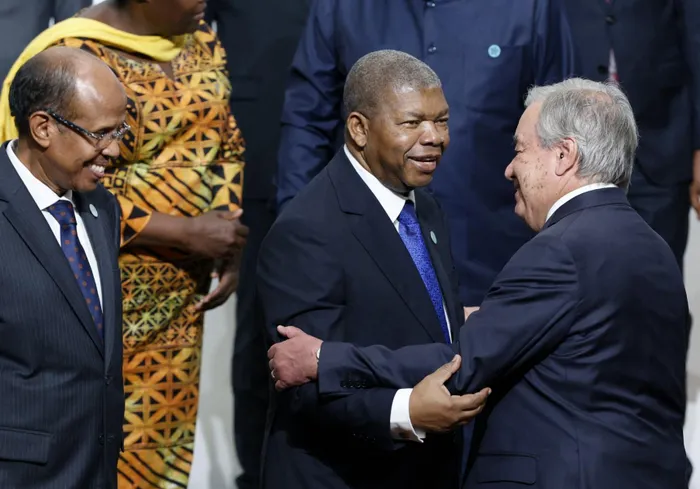AU's Affirmation of SA's G20 Leadership A Win for Continental Solidarity

African Union Commission Chairperson Mahamoud Ali Youssouf (left), Angolan President Joao Lourenco and United Nations Secretary-General Antonio Guterres during the 9th Tokyo International Conference on African Development (TICAD 9) held in Yokohama, Japan on August 20, 2025.
Image: AFP
Kim Heller
The African Union Commission's (AUC) recent statement supporting South Africa's chairmanship of the Group of Twenty (G20) and its hosting of the upcoming November summit was an act of deft diplomacy and a long-awaited expression of African assertiveness and solidarity, issued in the wake of Donald Trump's recent verbal onslaught on South Africa.
It provides a necessary counter-narrative.
On 7 November 2025, just over a week before the G20 Summit commences in Johannesburg, the President of the United States announced that no U.S. government officials would attend the gathering. In his usual incendiary style, Donald Trump besmirched South Africa as a "country of disgrace"—where Afrikaners are "slaughtered" and farmland is "stolen."
In Trump's world of make-believe, South Africa is an unfit, anti-white host. This was not the first time that Donald Trump had verbally assaulted South Africa. Trump practically ambushed President Cyril Ramaphosa during the South African president's visit to the Oval Office in May 2025.
Trump dramatically presented erroneous reports of farm attacks and land confiscations in South Africa, which caused serious reputational damage to South Africa amid general outrage in the country and across the continent. This deviant and ill-intended rhetoric is in line with Trump's persistent degradation of Africa, his dismissive and divisive approach, and his malicious vengeance for leaders who do not align with U.S. interests or allies.
Democratic South Africa is not flawless. It is a sorry land of inequality, poor governance, and joblessness. However, South Africa is a constitutional democracy founded on human rights, equality, and multilateralism. Trump's periodic assertions of "white genocide" and land seizures in South Africa, despite ample evidence to the contrary, are not a naive narrative but nasty acts of deliberate disinformation.
His words are weaponised and triggered to avenge South Africa for its foreign policy autonomy, its ethical posture on Palestine, and its non-alignment stance in the Ukraine-Russia conflict. In its statement, the AUC described South Africa as a "vibrant democracy that supports equality, human rights, and the rule of law."
This portrait of South Africa sharply contradicts Trump's depiction of a lawless nation. In the statement, the AUC celebrated South Africa's "rich diversity" and the ability of "people of many races, cultures, languages, and faiths [to live] together in unity," describing this diversity as a "source of national strength and global admiration."
The AUC's statement praised South Africa's "exceptional leadership in promoting the priorities of the Global South, advancing sustainable development, and strengthening inclusive global governance."
The AUC statement also asserts that the continent is not an acquiescent pawn but an active participant in history with its own story to tell. The Commission called for international partnerships with Africa based on "mutual respect, truth, and constructive cooperation."
Perhaps at last the African Union (AU), which has been a trembling giant, has found its voice. While the statement was commendable, it was also long overdue—Trump's disdain for South Africa and the African continent in general dates back to his first presidency.
The AU has failed to raise its voice or proclaim its collective might, especially when Western powers undermine or attempt to destabilise African countries. When President Cyril Ramaphosa was hijacked in the Oval Office in May 2025, the AU's silence was deafening.
When Trump debased and ridiculed African leaders and African sovereignty, the AU remained mute. This has undoubtedly encouraged Trump's disrespect.The AU seems to have found its voice.
Its affirmation of South Africa's G20 role and its recent rejection of U.S. claims of religious persecution against Christians in Nigeria are positive and encouraging. The AU was firm in affirming Nigeria's sovereignty and Nigeria's right to control its internal affairs without external manipulation or meddling.
This more vocal and confident African diplomacy is crucial if Africa is to emerge as sovereign, in charge of its own fate and fortune, and navigating its own narrative and historical impact. Trump's boycott of the G20 Summit is geared to diminish Africa. He clearly hopes to discredit South Africa and the summit itself.
However, without a U.S. presence, the G20 Summit could be a key opportunity for African unity and self-determination. If optimised, the summit could be a prized opportunity to deepen ties with BRICS nations and the Global South, on the firm foundation of more equitable partnerships, rather than U.S. bullying tactics.
By strongly supporting South Africa's G20 leadership, the AU is asserting Africa's pride of place on the global stage and rejecting a submissive, secondary posture in the face of Western powers.
However, words are not enough.
The AU must transform itself from a trembling giant into a majestic baobab. Whether the AU and nation-states can move from symbolic action to real economic and political empowerment is still in doubt.
For now, the structural reliance on a white-powered global economic ecology remains intact and largely undisturbed. Whether the G20 in South Africa will represent a new start for Africa within the global economic matrix remains uncertain. What is certain is that Trump will not care.
For he does not, nor is he ever likely, to respect Africa. He will not be moved by any AU statement. What is certain is that the continental body has lost much of its legitimacy worldwide and in Africa.
To renew its standing, it will need to extend well beyond diplomatic defiance. Until it champions a strong decolonised developmental approach that is fixed on Africa's political and economic sovereignty, the AU may as well remain mute.
* Kim Heller is a political analyst and author of No White Lies: Black Politics and White Power in South Africa.
** The views expressed do not necessarily reflect the views of IOL, Independent Media or The African.